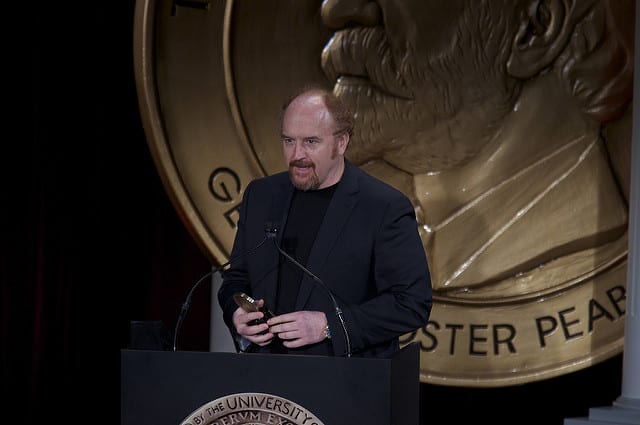
A cultural revolution taking place, where long-due justice is finally being served against legions of lecherous men populating society’s halls of power. After decades of being ignored, shamed and silenced, victims of sexual assault and harrassment by men in journalism, Hollywood and politics are finally having their claims taken seriously. Even the most powerful predators are facing unprecedented levels of social and professional punishment.
However, I’m starting to worry that this thirst for vengeance may be morphing into a moral panic, with artistic expression laid waste as victim. Take Louis C.K. After confirming allegations that he masturbated in front of women without their consent, C.K.’s shows were dumped by FX, his upcoming Netflix special was cancelled and his invitation to perform at HBO’s “Night of Too Many Stars” was rescinded. So far, so good. Without searing consequences for repugnant behavior, men conditioned to treat women as sexual objects will have little incentive to change. However, HBO also removed C.K.’s past work from their streaming service, and The Orchard decided to cancel distribution of C.K.’s new movie, “I Love You, Daddy.”
While Louis C.K. should certainly face professional consequences for his abhorrent behavior, burying his past work is misguided on a number of fronts. For one thing, streaming C.K.’s work does not benefit him financially, so the retributive motive does not apply. Unlike with music, television streaming does not typically pay content creators per view. C.K. has already made off with HBO’s money.
Perhaps proponents of burying C.K.’s past work would argue that doing so is merely removing work that has lost its aesthetic or comedic value. After all, how many people can really enjoy watching C.K.’s stand-up or acting in light of his vile behavior? Such an argument gains strength in light of C.K.’s prurient creative bent. However, this argument has no real evidence behind it. Anecdotally, I still greatly enjoy C.K.’s comedic genius. More broadly, this argument ignores our long-standing appreciation for art created by similarly flawed individuals. For example, Tupac Shakur (2Pac) is widely considered to be one of the greatest rappers of all time, despite his 1993 conviction of first-degree sexual abuse. Furthermore, 2Pac’s song lyrics were frequently misogynistic and objectifying. In “I Get Around,” 2Pac sings the praises of “those who break their neck to keep their hoes in check,” and slut-shames women by saying “I don’t want it if it’s easy.” How can people enjoy 2Pac’s misogynistic music in light of his rape conviction? People can, and they do, rendering toothless objections to C.K.’s work on the grounds that his unsavory behavior detracts from its comedy and quality.
Maybe advocates for removing C.K.’s work have some unyielding moral reason, or want to attack his legacy. Given how poorly-argued and ambiguous this line of reasoning is, I can’t counter it directly. However, we ought to consider the worrying precedent that purging C.K.’s work would set. Imagine if every distribution company followed in the footsteps of HBO and The Orchard. You could say goodbye to such classics as “American Beauty” (Kevin Spacey), “Pulp Fiction” (John Travolta, Harvey Weinstein), “Rain Man” (Dustin Hoffman), “Annie Hall” (Woody Allen), “Star Trek: The Original Series” (George Takei), “Rocky” (Sylvester Stallone) and countless others.
If art can be condemned for the crimes of its creators, we must expunge works created by deceased wrongdoers as well. Bid farewell to the works of Lord Byron (rape, incest), William Golding (rape), J.D. Salinger (pedophilia) and Caravaggio (murder).
Even if one were okay torching all this art for some obscure moral end, the fact of the matter is that art exists independent of its creator. The entire practice of formal analysis is contingent on this fact. Formal analysis consists of explaining the composition and function of visual art, with no regard for subject or author. While there is much disagreement among philosophers over whether beauty is objective or subjective, none of the main schools of thought argue that the artist’s virtue has any bearing on the aesthetic value of his or her work.
Rather, the push for removal of C.K. and others’ past work seems to be an emotional overreach by the otherwise legitimate #metoo movement. While barring C.K. from future opportunities serves as a deterrent for prospective predators, removing his past work is both accomplishing nothing and setting a worrying precedent.

